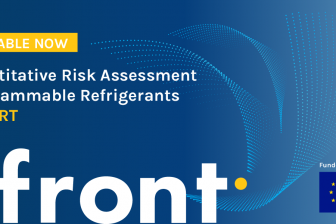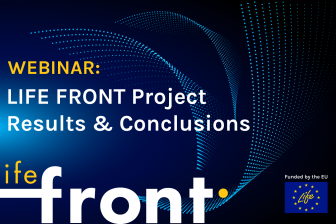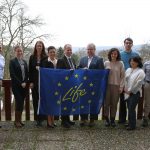Interview with a LIFE FRONT partner – Laure Meljac

2019 will be a year rich in activities and researches for the LIFE FRONT partners. Find here below a short interview with one of the most active and enthusiastic project partners, Laure Meljac from Swedish heat pumps’ manufacturer NIBE Climate Solutions.
Q: Introduce yourself in a few sentences: Where do you work and what do you work with? What is your part in LIFE FRONT?
A: I have entered the heat pump industry in 2006 as an R&D engineer and project leader for the development of new heat pumps. After a couple of years, I started managing the internal testing laboratory and became more focused on standards and conformity to legislation. I joined NIBE’s international affairs department in January 2017. I am active in most of the heat pump testing standard working groups at the EU and international (ISO), I am chairing the steering committee of the European certification HP-KEYMARK and I am closely following the European legislation related to heat pumps.
In the LIFE FRONT project, I represent the company NIBE. NIBE has a long experience in using flammable refrigerant in heat pumps and we are now sharing it with the other LIFE FRONT partners.
Q: What are the key aspects for the safety of hydrocarbon-based RACHP systems in your opinion?
A: Due to their physical properties, hydrocarbons are excellent refrigerants and using hydrocarbon in RACHP systems makes perfect sense. However, hydrocarbons are flammable and safety aspects have to be considered very seriously. We need to keep in mind that accidents caused in the field by products using hydrocarbons will kill the technology, we cannot afford it. We need to have a long-term vision and to ensure the durability of the RACHP equipment using hydrocarbons.
To ensure the safe use of hydrocarbon in RACHP systems, in my opinion, it is necessary that the product quality (including production, raw material, and components) reaches a high level, to prevent a catastrophic leak to occur. In addition to that, good skills and awareness of installers are key, to ensure safe installation, maintenance and dismantling operations of products in the field. Adjusting the charge size limitation according to the usage and gradually pushing back the limitations seem reasonable; in particular, this will allow the entire industry, including installers, to get used to the usage of hydrocarbon, to enhance the product and installation quality and thus to ensure safe usage of hydrocarbons.
Q: What are the latest updates from the standardisation meetings you attended?
A: Within the standardisation working group, only the term flammable refrigerant is being used. So far, it has been reported that for some sectors, such as industrial refrigeration, no barriers hinder the use of flammables whereas for other sectors, such as space heating and cooling, the charge size limitation is still a barrier for the development of products using flammable refrigerants.
However, the target in term of maximum allowable charge size of flammable refrigerant for each type of application is not yet clearly defined and there is no consensus for the moment on the maximum allowable charge size. In my opinion, there is clearly a lack of reliable technical inputs, in particular for the chiller product group, that includes heat pumps covered by regulation 813/2013, i.e. heat pump using water as heat sink. I truly believe that LIFE FRONT could bring valuable technical inputs, based on experience and practical work.
Q: What is your experience with LIFE FRONT?
A: I have joined the LIFE FRONT is July 2018, a year after the project started. The project only involves a limited number of partners, which makes the discussion and work really efficient. Phone conferences held regularly help keeping the project alive and moving forward.
The project is well structured, and a good communication has been established between the partners which is of course very positive. Partners are from various business areas and have various background which help broadening the scope and considering the problematic from various angles.
Q: What have you personally learned from the LIFE FRONT project?
A: Despite the heavy paperwork and administrative reporting required by the European Commission, being an expert at CEN /TC 182/Working Group 12 (dealing with flammable refrigerants), it is really interesting for me to be part of LIFE FRONT, as it is a unique opportunity to learn more about the technology and to provide concrete inputs to the standardisation process.







